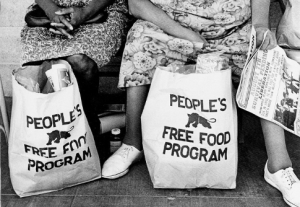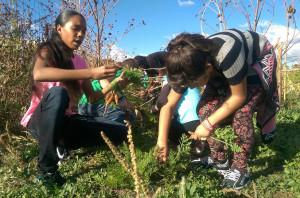
This article was written by SWOP’s Food Justice Organizer Rodrigo Rodriguez, and originally published on El Grito de Neuvo Mexico. Learn about Rodrigo’s work with Project Feed the Hood on their facebook and instagram pages, and follow him on twitter @5RO5.
Here in New Mexico, we hold this radical idea that food is a human right, and that the best way to fight hunger is to feed people. That each and every one of our relations, two- and four-legged alike, should be able to eat good food when they are hungry. These are the ideas that we hear again and again through our work at SouthWest Organizing Project in our communities. Project Feed the Hood operates under this most basic of assumptions, that ‘you can’t free the people if you can’t feed the people’.
In the 1960s, the Black Panther Party started a free breakfast program in Oakland as one of the party’s community services programs. The free breakfast program served poor neighborhoods and fed 10,000 children every morning before school. The Panthers believed that “Children cannot reach their full academic potential if they have empty stomachs.” This program was soon replicated across the country by groups like the Young Lords in New York, and here in New Mexico by the Chicana/os in the Black Berets.
The breakfast program created in Albuquerque by the Black Berets was literally the first of its kind for New Mexicans. Young people practicing self determination in the barrio, liberation through breakfast. President Johnson in 1966 created a pilot program to provide a school breakfast in a handful of rural communities. The success of the Panthers and Berets and similar programs shook the power structure to it’s foundation, challenging structural inequality and shaming elected officials. President Johnson’s pilot program was made permanent in 1975- but not before steps were taken to repress many of the community led programs. For instance, on Sept. 8, 1969 armed police raided the Watts breakfast program while children were eating.
Former Director of the FBI J. Edgar Hoover understood how power could manifest through a free breakfast program, as he made clear in this memo sent as a part of COINTELPRO on May 15, 1969:
“The BCP (Breakfast for Children Program) promotes at least tacit support for the BPP (Black Panther Party) among naive individuals… And, what is more distressing, provides the BPP with a ready audience composed of highly impressionable youths… Consequently, the BCP represents the best and most influential activity going for the BPP and, as such, is potentially the greatest threat to efforts by authorities to neutralize the BPP and destroy what it stands for.”
The way that we currently feed people in this country, and in much of the industrialized world, involves a convoluted system of government subsidies, multinational corporations, consumer protections, genetically altered cash crops, biofuels, migrant labor, factory and family farms, concentrated feeding operations, commodities speculation, capitalism and massive amounts of waste. Our food system is, in a word, broken.
In a state like New Mexico, a fundamentally agricultural state, the food system also includes complex water laws, droughts, land grabs, institutional racism and a legacy of resource extraction that leaves us with $4 billion in Big Ag. profits annually to go with some of the worst childhood hunger in the country. Nearly 1 in 3 children in New Mexico doesn’t get enough to eat, and almost 1 in 5 adults.
Since we started Project Feed the Hood in 2009, we’ve helped facilitate the investment of almost $1 million in programs that bring locally grown and healthy foods into our schools and communities. Initiatives like ‘New Mexico Grown Fresh Fruits and Vegetables for School Meals’, which provides funds from the state legislature to purchase locally grown produce for school meals. The ‘SNAP Double Up Food Bucks’ program has also incentivized eating healthy food grown locally, and is a major boost for the local economy that essentially pays for itself. “In addition to the federal food SNAP dollar that gets matched and goes directly to farmers, the funds will be matched $1 for $1 with federal grant funds. And, as we know, SNAP is one of the most important stimulus programs there are, taking every SNAP dollar spent and multiplying it by $1.8 in additional economic activity in a community,” offers Denise Miller from the New Mexico Farmer’s Market Association.
When we spend our money- even federal SNAP dollars- with our local community farmers, we take an important step toward restorative economic justice. We can have an even more profound impact by leveraging the purchasing power of school districts and other places where New Mexicans are eating public meals, such as senior citizen centers, hospitals, clinics, and correctional facilities. We’re already spending tax dollars to feed our people- we can and should be purchasing as much of that food as possible from our local farmers.
Just how big is that school district purchasing power? According to the APS approved annual budget, the district Food Services Fund “anticipates receiving $35.7 Million from revenue sources which, when added to the estimated fund balance carryover of $17.5 Million, provide $53.3 Million in total resources available in Fiscal Year 2015-16.”
To put that in perspective, Albuquerque Public Schools (APS) is the 34th largest district in the United States, with over 90,000 students, 11,500 employees and 136 schools. This year, 74 of those school qualified for The Community Eligibility Provision (CEP). The CEP is a provision from the Healthy, Hunger-Free Kids Act of 2010 that allows schools with high poverty rates to provide free breakfast and lunch to all students. Currently, 52 elementary schools in APS are funded by the Breakfast After the Bell Program, with about 21,000 breakfast meals served every day in the city.
The question we then ask the of policy makers at APS is this: How much of that food is being purchased locally, and how much is going to a big food distributor to buy tomatoes trucked in from Mexico? And how do we use our school and food systems to build healthy kids and healthy communities?
In addition to the hunger crisis, New Mexico currently has the worst rate of childhood poverty in the country. Given the current state of our state, it’s safe to assert that the school meals being provided are a primary source of food for many of New Mexico’s young people. We owe it to them and to our future to provide the highest quality food available. We need to see more investment from the state and the expansion of training new farmers, women farmers, and especially young people of color farmers. There is a movement of growers, institutions, and community partners already working in concert to boost our economy and eradicate our child hunger crisis, and we have the knowledge, resources, and labor force necessary to build a localized food system that prioritizes our communities health and values.
Instead, what we’re seeing is a State Legislature and Governor that are largely ignoring the fact that 1 in 3 kids isn’t getting enough to eat. Similarly to other states in the nation, the New Mexico Legislature is actively seeking to roll back access to food for hungry people. One such attempt is a proposed cut of $300k from the “SNAP Double Up Food Bucks” program. There is also proposed legislation to undermine the effectiveness of “Breakfast After the Bell”. Let us also not forget the SNAP ‘Work Requirement’ fiasco, in which Governor Martinez’s newly appointed Human Services Department Secretary Brent Earnest and his predecessor Sidonie “Hunger doesn’t exist” Squier have spent the last 18 months trying to cut tens of thousands of New Mexicans off SNAP.
What HSD has disguised as a ‘work requirement’ program with time limits is really just a countdown to hunger for our most vulnerable families and community members, and an opportunity for an out-of-state contractor to profit off their poverty. The hard truth is that since the recession of 2008, New Mexico has been last in job growth and just about every other significant economic marker. There is no evidence that the corporation (SL Start) contracted to run the ‘New Mexico Works’ program has been effective at helping New Mexicans return to the workforce, either through training or job placement. Especially when the jobs just do not exist.
The reality is that the governor and legislature have failed to create meaningful job growth, nor have they stimulated New Mexico’s economy with the corporate tax packages and giveaways we’ve seen the last 5-plus years. Albuquerque is the only city of its size in the entire country to experience a double dip recession and New Mexico as a whole is more dependent on federal jobs and assistance than ever.
Our state’s most urgent needs are to address hunger, food access, and poverty rates that are the worst in the country. Meanwhile, this 2016 legislative session has seen nothing but blustering from both sides about ‘boomerang thugs’, driver’s licenses and pizza parties.
What does that mean for SWOP, Project Feed the Hood and our communities?
How do we, as a state, as local communities, as parents, teachers, students, farmers, and as eaters build a food system for New Mexico that reflects the vision, values and resources of our enchanted state?
How do we build localized food systems that work within the historical and cultural contexts of our communities to not only address hunger but also to develop food sovereignty? How do we empower communities to take control of the food they eat, the food our kids eat at schools, and to reestablish food systems, land bases, resources and practical economies that work to improve community based health and strengthen localized democracy?
We can find many of the answers in the lived experiences of our ancestors and the historical communities of New Mexico. Reconnecting traditional growing methods, holistic health practices, and a deep appreciation of our place within the global ecosystem.
There is a transformative healing nature associated with food in New Mexico. As one of our farmers, Lorenzo Candelaria, says, “comida es medicina y medicina es comida”. There is an ancient wisdom in our three sisters- corn, beans and squash- and there is inherent power in our chile, in our quelites, in our melons, in our agua and in our tierra.
Having a meal with our vecinos, growing a garden, sharing the cosecha, teaching young people, taking care of our ancianos, stewarding our land and water: these are the values of the Nuevo México that raised me. These are the values that carry me forward in the fight for food justice, for food sovereignty, and for that simple idea that you can’t free the people if you can’t feed the people.
¡Arriba Nuevo México, mi estado querido!




The views and opinions expressed in this post are those of the author(s) and do not necessarily reflect those of MomsRising.org.
MomsRising.org strongly encourages our readers to post comments in response to blog posts. We value diversity of opinions and perspectives. Our goals for this space are to be educational, thought-provoking, and respectful. So we actively moderate comments and we reserve the right to edit or remove comments that undermine these goals. Thanks!